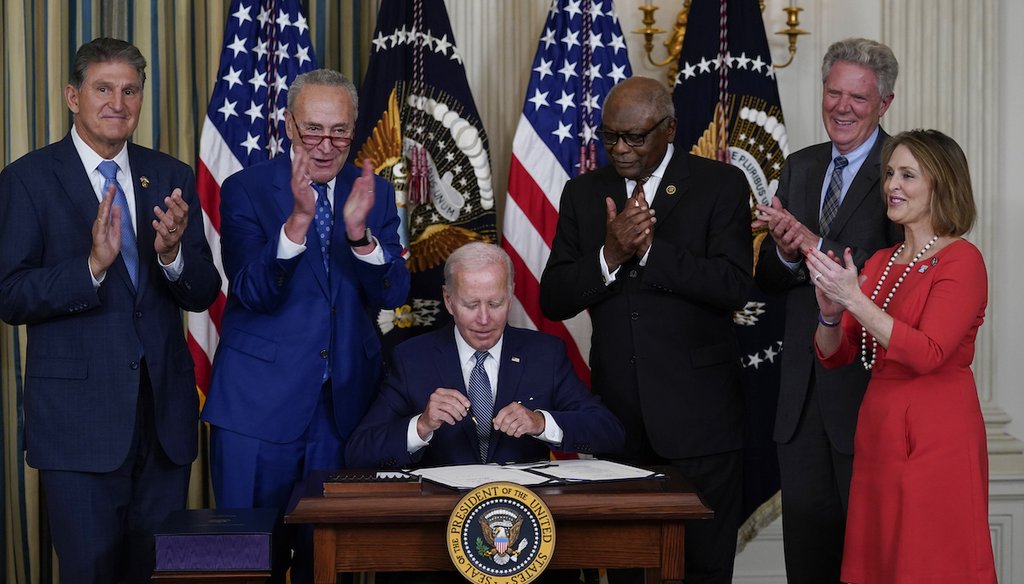Get PolitiFact in your inbox.

President Joe Biden signs the Democrats' landmark climate change and health care bill Aug. 16, 2022. Republicans are critical of money for the IRS in the bill. (AP)
Tim Scott mangles false GOP talking point on IRS hounding average taxpayers
If Your Time is short
-
Under the Democrats’ tax and spending bill, the IRS will get tens of billions to target corporations and high-net-worth individuals to collect the taxes they owe.
-
Scott made it sound as though all taxpayers making less than $200,000 are at risk, but the type of income in the 90% figure represents about 17% of all individual returns filed.
-
Scott’s claim is based on a 2021 analysis of a totally different policy.
No one likes getting a letter or call from the IRS. Republicans say that’s exactly what will happen to more and more people when the Internal Revenue Service gets billions of dollars from the Democrats’ Inflation Reduction Act.
The bill puts $80 billion into the IRS. The agency says it will use much of the money to get corporations and high net-worth people to pay the taxes they legally owe.
Sen. Tim Scott, R-S.C., told Fox News that although the IRS might say it won’t be coming after middle-income people, it will have to.
"The Congressional Budget Office says that 90% of the revenue generated from the new IRS agents will come from people making less than $200,000," Scott said Aug. 10. "The revenue generated will be $300-plus billion."
We asked Scott’s staff where he got his numbers, and they said he meant to cite the congressional Joint Committee on Taxation, a nonpartisan analytic arm of Congress.
But that committee never assessed the impact of the current effort to boost enforcement capacity at the IRS. And the effort is projected to produce $204 billion in revenue over the decade, not the $300 billion Scott said.
Scott’s not the only Republican to warn that most of the money will come from people and businesses making less than $200,000. The data show that Scott and his colleagues have misapplied estimates from a year-old congressional letter that addressed a different topic.
The Inflation Reduction Act boosts IRS enforcement capacity by $46 billion. There’s another $23 billion for information technology and other back-office functions, and about $3 billion to improve taxpayer services. The overall goal is to reduce what’s known as the tax gap. That’s the difference between what people and companies pay in taxes and what they actually owe under the law. The problem comes down to people failing to report a portion of their income.
Over the years, funding cuts slashed the number of staff available to take on the high-dollar, more complicated tax evasions schemes. Between 2010 and 2018, the number of enforcement personnel fell by nearly a third.
When the CBO looked at the full menu of changes at the IRS — enforcement plus the rest — it predicted that the agency would collect an additional $204 billion over the course of the decade. That ranged from a low of $3 billion in the first year, to a high of $37.5 billion in 2030.
The CBO said the additional revenues would come from a combination of enforcement and better compliance.
The CBO report said nothing about what income groups the new collections would come from. Scott was mistaken to cite the CBO as a source for this information. Others who issued the same warning about people making under $200,000, such as Republican National Committee chair Ronna McDaniel, cited the Joint Committee on Taxation.
That is also misleading.
In 2021, the Biden administration was considering a rule that would require banks to report the flow of money in and out of accounts. A member of Congress asked the Joint Committee on Taxation to assess the impact.
The Joint Committee said in a letter that its tax model wasn’t able to answer the question of what the plan’s impact would be. But the committee did offer some estimates of sources of income that are typically underreported and would likely be touched by the proposal.
Featured Fact-check
One example was what’s called Schedule C income. That’s money from a business you run yourself or extra income you make on the side. The report grouped tax filers by income. Then, for each income group, it estimated the filers’ share of total tax assessments under IRS audits that revealed unreported Schedule C income.
About 90% of those tax assessments were from people who declared that they made $200,000 or less. That’s the source of Scott’s claim, but in addition to its other limitations, that statistic concerns a relatively small slice of all taxpayers.
In 2019, the IRS processed 158 million individual returns. The number of those returns that included a Schedule C was 27 million, about 17% of the total. With the $80 billion, the IRS would tackle a wider range of tax noncompliance, including large multinational corporations and people misusing estate and gift tax returns to reduce their taxable income.
Tax experts say the Republican use of the letter’s statistics is fundamentally misleading.
"Focusing on the limitations of the (Joint Committee on Taxation) analysis is like listing all the missing leaves and branches on a tree when the problem is that we're in entirely the wrong forest," said Chye-Ching Huang, the executive director of the Tax Law Center at New York University Law School. "The analysis is not about the proposal that was enacted."
Among other key disconnects, Huang noted, the analysis grouped people by their income as they reported it, "rather than true income."
"If a filer told the IRS that they only had $200,000 in wage income, but failed to report $1 million in income from a cash business, they would be classified in this table as having $200,000 of income, even though they really made $1.2 million," Huang said.
To be sure, the Joint Committee’s letter noted this and several other limitations, including that it was based on 10-year-old data and that the random audits behind the data were known to skew the results toward lower-income filers.
Marc Goldwein is the senior policy director for the Committee for a Responsible Federal Budget, a group that favors deficit reduction. He said the letter is too far removed from the current focus on corporations and upper-income filers to be helpful.
"Most of the underreporting comes from people making six-figure incomes or more," Goldwein said. "Very little comes from wage income. It’s from income that’s not subject to strong reporting requirements."
The IRS and Treasury Department say that they will be hiring higher-skilled investigators to target corporations and high-net-worth individuals. Earners making less than $400,000, they said, won’t see any change in enforcement.
The amount of unreported money at the upper end of the income scale makes it possible that the IRS will collect $204 billion over 10 years, Goldwein said. The projected additional revenues of $37.5 billion in 2030, for example, represent about 6% of a tax gap estimated at about $585 billion.
"Generally speaking, we can ramp up audits in a way that is concentrated on upper-middle and upper-income taxpayers and reach the desired revenue goal," Goldwein said.
Scott said the CBO "says 90% of the revenue generated from the new IRS agents will come from people making less than $200,000," and that the government will collect more than $300 billion.
The actual revenue estimate is $204 billion.
The 90% statistic comes from the Joint Committee on Taxation — not the Congressional Budget Office — and its letter to a member of Congress said nothing about tax audits. Tax experts said it is misleading to use the letter’s data the way Scott did. It addressed a totally different policy option, and it distorted who might be affected by categorizing taxpayers based on the income they reported, not their real incomes.
Scott made it sound as though all taxpayers making less than $200,000 are at risk, but the type of income in the 90% figure represents about 17% of all individual returns filed.
We rate this claim False.
Our Sources
Real Clear Politics, Sen. Tim Scott: 90% Of Funding For New IRS Agents Will Come From People Making $200,000 Or Less, Aug. 11, 2022
Joint Committee on Taxation, 2021 letter, Aug. 17, 2021
Ronna McDaniel, tweet,Aug. 12, 2022
Wall Street Journal, Editorial: The IRS Is About to Go Beast Mode, Aug. 2, 2022
Tax Notes, Tax Noncompliance and Measures of Income Inequality, Feb. 17, 2020
Congressional Budget Office, Estimated Budgetary Effects of H.R. 5376, the Inflation Reduction Act of 2022, Aug. 5, 2022
Committee for a Responsible Federal Budget, The Inflation Reduction Act would reduce the tax gap, Aug. 4, 2022
IRS, IRS 2021 data book, accessed Aug. 10, 2022
IRS, IRS data book: Compliance Presence, accessed Aug. 10, 2022
U.S. Treasury Department, Secretary Yellin letter to IRS Commissioner Rettig, Aug. 10, 2022
Internal Revenue Service, Updated IRS audit numbers, May 26, 2022
U.S. Treasury Department, The Case for a Robust Attack on the Tax Gap, Sept. 7, 2021
David Kamin, tweet, professor of law, New York University Law School, Aug. 3, 2022
IRS Commissioner Rettig, Letter to the U.S. House of Representatives, Aug. 4, 2022
National Bureau of Economic Research, Tax Evasion at the Top of the Income Distribution: Theory and Evidence, March 2021
Internal Revenue Service, SOI Tax Stats - All Available Years - IRS Data Book, May 26, 2022
Congressional Budget Office, Letter to Sen. Lindsey Graham: Increased Funding for the Internal Revenue Service in H.R. 5376, Nov. 18, 2021
Statement, Office of Sen. Tim Scott, Aug. 16, 2022
Email exchange, Chye-Ching Huang, executive director, Tax Law Center, New York University Law School, Aug. 16, 2022
Interview, Marc Goldwein, senior policy director, Committee for a Responsible Federal Budget, Aug. 16, 2022
Browse the Truth-O-Meter
More by Jon Greenberg
Tim Scott mangles false GOP talking point on IRS hounding average taxpayers
Support independent fact-checking.
Become a member!
In a world of wild talk and fake news, help us stand up for the facts.


























































